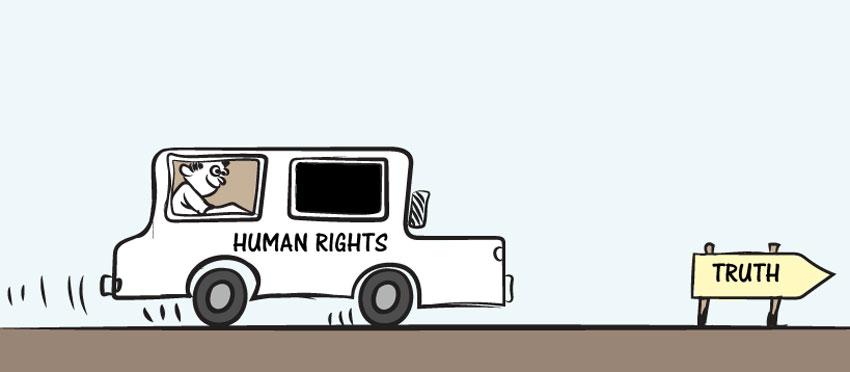Reply To:
Name - Reply Comment
Last Updated : 2024-05-21 04:21:00

Today in Sri Lanka, President Ranil Wickremesinghe and the splintered Sri Lanka Podujana Peramuna (SLPP) government are trying pull the country out of its worst ever socioeconomic crisis since independence in 1948. With the approval of the International Monetary Fund’s (IMF) loan of US$2.9B the situation has improved and President says he hopes to bring down the unprecedented cost of living within few months. But with the media and especially the social media saying different stories at different times and sometimes giving a twisted interpretation to fit into the agendas of some political parties, the truth is in a lying mess.
It is in this context that we need to contemplate on the United Nations International Day for the ‘Right to the Truth Concerning Gross Human Rights Violations and for the Dignity of Victims’. In a statement to mark this international day, which was on March 24, the UN says the right to the truth is often invoked in the context of gross violations of human rights and grave breaches of humanitarian law. The relatives of victims of summary executions, enforced disappearance, missing persons, abducted children, torture, require to know what happened to them. The right to the truth implies knowing the full and complete truth as to the events that transpired, their specific circumstances, and who participated in them, including knowing the circumstances in which the violations took place, and the reasons for them.
This annual observance pays tribute to the memory of Monsignor Óscar Arnulfo Romero, who was murdered on March 24, 1980. Monsignor Romero was actively engaged in denouncing violations of the human rights of the most vulnerable individuals in El Salvador. The purpose of the day is to: Honour the memory of victims of gross and systematic human rights violations and promote the importance of the right to truth and justice; Pay tribute to those who have devoted their lives to, and lost their lives in, the struggle to promote and protect human rights for all; Recognize, in particular, the important work and values of Archbishop Oscar Arnulfo Romero of El Salvador, who was assassinated on March 24,1980, after denouncing violations of the human rights of the most vulnerable populations and defending the principles of protecting lives, promoting human dignity and opposition to all forms of violence.
On December 21, 2010, the United Nations General Assembly proclaimed March 24 as the International Day for the Right to the Truth concerning Gross Human Rights Violations and for the Dignity of Victims. The date was chosen because on March 24, 1980, Archbishop Oscar Romero was assassinated, after denouncing violations of human rights. In a study conducted in 2006 the Office of the UN High Commissioner for Human Rights concluded that the right to the truth about gross human rights violations and serious violations of human rights law is an inalienable and autonomous right, linked to the duty and obligation of the State to protect and guarantee human rights. In a 2009 report on the Right to the Truth, the Office of the UN High Commissioner for Human Rights identified best practices for the effective implementation of this right, in particular practices relating to archives and records concerning gross violations of human rights, and programmes on the protection of witnesses and other persons involved in trials connected with such violations. The Commission on the Truth for El Salvador was established in accordance with the Mexico Agreements of April 27, 1991 to investigate serious acts of violence that had occurred since 1980 and whose impact on society was deemed to require an urgent public knowledge of the truth. In its report of March 15, 1993, the Commission documented the facts of the assassination of Archbishop Romero by pro-government forces, the so-called “death squads”. He was shot dead by an assassin as he celebrated mass on March 24, 1980.
In a message UN Secretary General António Guterres says The International Day for the Right to the Truth Concerning Gross Human Rights Violations and the Dignity of Victims reminds us that truth is a powerful light. A light that shines on violations that perpetrators would prefer to remain hidden. A light that reveals a path towards peace, justice and reparation for victims, and compels countries to meet their obligations under international law. And a light that illuminates the underlying causes of these violations, so that we can prevent them from taking root. When the light of truth is extinguished, societies are plunged into a dark world of threat, lies and mistrust.

Add comment
Comments will be edited (grammar, spelling and slang) and authorized at the discretion of Daily Mirror online. The website also has the right not to publish selected comments.
Reply To:
Name - Reply Comment
The state-run loss-making State Mortgage & Investment Bank (SMIB) has reveale
US authorities are currently reviewing the manifest of every cargo aboard MV
On March 26, a couple arriving from Thailand was arrested with 88 live animal
According to villagers from Naula-Moragolla out of 105 families 80 can afford
20 May 2024 - 0 - 106
20 May 2024
20 May 2024

18 May 2024